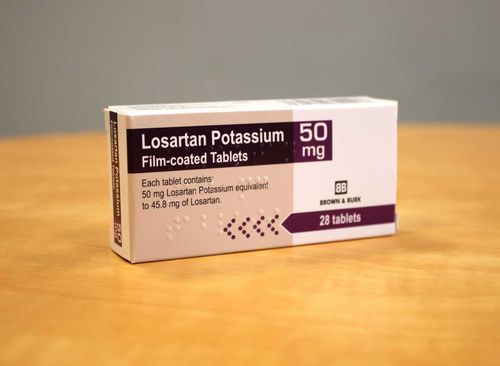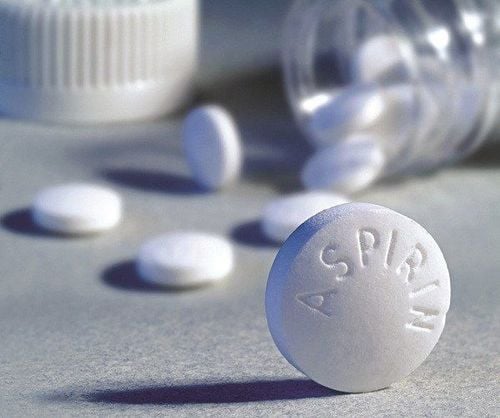This is an automatically translated article.
Deplat drug contains the active ingredient Clopidogrel, a prodrug that is metabolized by CYP450 enzymes to an active substance that inhibits platelet aggregation. The drug is indicated for the prevention of atherothrombotic and atherothrombotic events in patients with atrial fibrillation.
1. What is Deplat?
Deplat contains the active ingredient Clopidogrel. Clopidogrel is a prodrug, which is metabolized by CYP450 enzymes to an active substance that inhibits platelet aggregation. The active metabolite of Clopidogrel selectively inhibits the binding of adenosine diphosphate (ADP) to the P2Y12 receptor on platelets and inhibits ADP activation, thereby inhibiting platelet aggregation. Due to the irreversible effect, platelets exposed to the metabolite of Clopidogrel are affected for the rest of its life (approximately 7-10 days). Because the active metabolite is formed by CYP450 enzymes (which can be inhibited by other drugs), not all patients achieve adequate platelet inhibition. Platelet aggregation and bleeding time gradually returned to baseline after discontinuation of treatment for about 5 days.
Clopidogrel is rapidly absorbed after oral administration. Peak plasma concentrations in unchanged form are reached approximately 45 minutes after oral administration. Clopidogrel and its major metabolite are reversibly bound to human plasma proteins by 98% and 94%, respectively. Clopidogrel is extensively metabolised in the liver by two main pathways: hydrolysis to carboxylic acid derivatives and metabolism by cytochrome P450 enzymes.
2. Uses of the drug Deplat
Prevention of atherothrombotic risk :
Myocardial infarction in adult patients (lasting from a few days to less than 35 days), ischemic stroke (lasting from 7 days to less than 30 days). 6 months) or established peripheral artery disease. Adult patients with acute coronary syndromes: The use of clopidogrel with acetylsalicylic acid (ASA) in patients with non-ST-elevation acute coronary syndromes (unstable angina and non-wavelength myocardial infarction). Q), including patients with stent placement after percutaneous coronary intervention; Acute ST-segment elevation myocardial infarction, used in combination with ASA in patients eligible for thrombolytic therapy. Prevention of atherothrombotic and venous thrombosis in atrial fibrillation:
Adult patients with atrial fibrillation with at least one cardiovascular event risk factor who are not suitable for treatment with vitamin K antagonists and has a low bleeding risk, clopidogrel is indicated in combination with ASA for the prevention of atherothrombotic and venous thromboembolism, including stroke.
3. Contraindications of Deplat
Deplat is contraindicated in the following cases:
Hypersensitivity to any ingredient in the formula; Active pathological bleeding such as ulcers or bleeding in the brain; Children, pregnant women and lactating women.
4. Dosage of Deplat
The drug is taken orally with or without food. Deplat is usually used in a single dose of 75mg/day. If a dose is missed within less than 12 hours, the patient should take the missed dose immediately and the next dose at the usual time. If more than 12 hours have passed, the patient should take the next dose at the scheduled time and do not double the dose.
5. Undesirable effects of the drug Deplat
Patients using Deplat may experience side effects including:
Frequency 1% to 10%:
Hematology: Bleeding. Frequency <1%:
Cardiovascular: Hemorrhagic stroke; Nervous system: Intracranial hemorrhage. Frequency unknown:
Cardiovascular: Hypotension, vasculitis; Dermatology: Acute generalized exanthematous pustulosis, bullous rash, eczema, erythema multiforme, exfoliative dermatitis, vesicular eruption, maculopapular rash, pruritus, pustular psoriasis, Stevens syndrome -Johnson, toxic epidermal necrolysis, urticaria; Endocrine and Metabolic: Insulin Autoimmune Syndrome; Gastrointestinal: Colitis (including ulcerative colitis or lymphocytic colitis), diarrhea, duodenal ulcer, gastric ulcer, pancreatitis, stomatitis; Hematology: Acquired coagulopathy, agranulocytosis, aplastic anemia, thrombocytopenia, thrombocytopenic purpura; Liver: Acute liver failure, hepatitis (non-infectious); Hypersensitivity: Angioedema, anaphylaxis, serum sickness; Immunology: Drug reaction with eosinophilia and systemic symptoms; Nervous system: Confusion, hallucinations, headache; Neuromusculoskeletal: Arthralgia, arthritis, myalgia; Renal: Increased serum creatinine; Respiratory: Bronchospasm , eosinophilic pneumonia, interstitial pneumonia; Other: Fever.
6. Notes when using Deplat
Lacunar stroke: In patients with a recent (within 180 days) lacunar stroke, the use of clopidogrel with aspirin was associated with an increased risk of major bleeding and all-cause mortality. Thrombocytopenia bleeding has been reported very rarely with the use of clopidogrel, some of which may occur after a short period of exposure. The condition can be fatal and therefore requires prompt treatment. Patients with renal impairment: Experience with clopidogrel in patients with renal impairment is very limited. Therefore, it should be used with caution in this group of patients. Patients with hepatic impairment: Therapeutic experience in patients with moderate hepatic impairment with the potential for visceral bleeding is very limited. Therefore, clopidogrel should be used with caution in this group of patients. Because Clopidogrel is metabolized to its active metabolite in part via CYP2C19, the use of drugs that inhibit this enzyme will result in decreased concentrations of the active metabolite of Clopidogrel. The clinical relevance of these interactions is unclear. Strong or moderate inhibitors of CYP2C19 should not be used concomitantly with clopidogrel. Surgical Patients: In patients undergoing cardiac surgery, discontinue Clopidogrel at least 24 hours and up to 5 days prior to surgery in consultation with an interventional cardiologist and surgeon. In patients undergoing drug-free surgery, the risks and benefits of clopidogrel should be evaluated between the surgeon and the cardiologist team. Coronary stenting: Early discontinuation of clopidogrel therapy may lead to stent thrombosis with myocardial infarction. In general, the duration of treatment is determined by the type of stent placed, whether acute coronary syndromes were present at the time of insertion, and the risk of bleeding and thrombosis. Pregnancy: Based on available data, an increased risk of major birth defects, miscarriage or adverse fetal outcomes is not associated with maternal use of Clopidogrel. According to the manufacturer, use should not be discontinued if necessary for the emergency treatment of stroke or myocardial infarction during pregnancy. Treatment guidelines recommend using clopidogrel only when clearly needed and for the shortest possible time until further fetal safety data are available. Lactation: Animal studies have shown that clopidogrel and/or its metabolites are excreted in milk. But it is not known whether the drug is excreted in human milk or not, so if you decide to take the drug, you must stop breastfeeding and vice versa. Above is information about uses, dosage and precautions when using Deplat. It is best for patients to consult a doctor and pharmacist before use to ensure safety for health.
Please dial HOTLINE for more information or register for an appointment HERE. Download MyVinmec app to make appointments faster and to manage your bookings easily.













